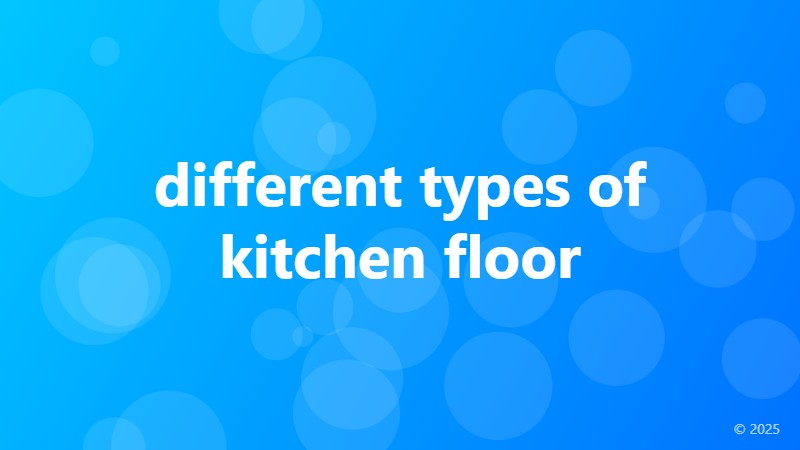different types of kitchen floor

Understanding the Different Types of Kitchen Floor
Kitchen floors are one of the most important aspects of a kitchen's overall design and functionality. With so many options available, choosing the right type of kitchen floor can be overwhelming. In this article, we'll explore the different types of kitchen floors, their benefits, and drawbacks to help you make an informed decision.
1. Hardwood Flooring
Hardwood flooring is a popular choice for kitchens due to its durability, aesthetic appeal, and ease of maintenance. Hardwood floors come in various species, such as oak, maple, and cherry, each with its unique characteristics. They can be stained to match any kitchen style, from traditional to modern.
Pros: Durable, easy to clean, can be refinished, adds value to the home
Cons: Can be expensive, sensitive to moisture, scratches easily
2. Ceramic or Porcelain Tile Flooring
Ceramic or porcelain tile flooring is another popular option for kitchens. These tiles are made from clay and other materials, then fired in a kiln to create a hard, non-porous surface. They come in a wide range of styles, from classic to modern, and can mimic the look of natural stone.
Pros: Durable, resistant to scratches and stains, easy to clean, affordable
Cons: Can be cold, may crack if dropped, grout lines can stain
3. Laminate Flooring
Laminate flooring is a cost-effective alternative to hardwood flooring. It's made from synthetic materials and designed to mimic the look of natural wood. Laminate flooring is durable, easy to install, and resistant to scratches and moisture.
Pros: Affordable, durable, easy to install, resistant to scratches and moisture
Cons: May not be as durable as hardwood, can be prone to fading, not suitable for high-moisture areas
4. Natural Stone Flooring
Natural stone flooring, such as granite, marble, and slate, adds a touch of elegance to any kitchen. These stones are durable, resistant to scratches, and can withstand heavy foot traffic. However, they require periodic sealing to maintain their appearance.
Pros: Durable, resistant to scratches, adds value to the home, unique appearance
Cons: Can be expensive, requires periodic sealing, may be slippery
5. Vinyl Flooring
Vinyl flooring is a budget-friendly option that's perfect for kitchens with high-moisture areas. It's made from synthetic materials and comes in a wide range of styles, from traditional to modern. Vinyl flooring is easy to install, durable, and resistant to scratches and stains.
Pros: Affordable, easy to install, durable, resistant to scratches and stains
Cons: May not be as durable as other options, can be prone to fading, not suitable for high-traffic areas
Conclusion
Choosing the right type of kitchen floor depends on your lifestyle, budget, and personal preferences. By considering the pros and cons of each type of flooring, you can make an informed decision that meets your needs. Whether you prefer the durability of hardwood or the affordability of vinyl, there's a kitchen floor type that's perfect for you.